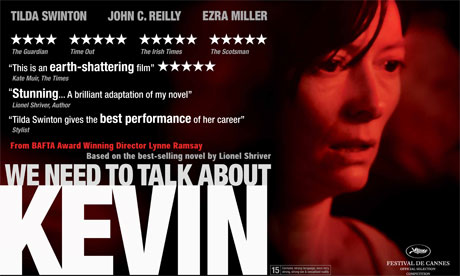Sunday 30 October 2011
We Need To Talk About Kevin (2011) - Lynne Ramsay
Forget Kevin, we need to talk about We Need To Talk About Kevin.
Firstly, we need to talk about the novel, written by Lionel Shriver. The plot details a young boy, the titular Kevin, who embarks on a school massacre during the late '90s - contemporary to the Columbine massacre of 1999. The first person narrative is from the perspective of Kevin's mother, Eva, as she recounts the story in a series of letters to her estranged husband. It's an incredibly dense novel, written as a stream of consciousness as Eva's pent up, repressed emotions are splurged across the page; the narrative unfolding like a twisted oedipal trajectory. The book's strength lies in its ambiguity. Shriver has dared to approach a subject that is unsettling, posing questions that most mothers would consider only in secret. Who will my child turn out to be? What if he/she turns out to be a murderer? Normally these questions are rhetorical, too horrific to contemplate. But Shriver breaks the taboo with a novel that delves into the darkest corners of parenthood. Ambiguity arises with regards to the nature/nurture debate. Was Kevin born an inherently evil child? Or is it the fault of his cold, callous, selfish and resentful mother? It's a question that remains unanswered and will undoubtedly divide readers. The novel is provocative, unsettling, disturbing and thrilling.
So then, we need to talk about the film. Due to its distinct narrative style, this is not a novel that is easily translated onto the screen. Yet Ramsay succeeds in her adaptation, by choosing to focus on the pscyhological aspects of the novel. In terms of genre, it most closely resembles a psychological horror drama. The film takes place essentially in the present, past events told in flashback rather than letter form. As such, what the viewer sees is Eva's skewed vision of her son; fragmented, fragile memories. Temporality is blurred like her visions, light and sound melting from one scene to the next, juxtaposed for significant, and occasionally comical, effect. It's almost to the point of one long extended montage. Yet unlike the novel, the film's script is its antithesis with remarkably little dialogue. It reflects the emptiness in Eva's life following "the event" - filled with silence, cold harsh surfaces, nothingness. The moody sound design echoes around Eva's sparse flat, exploding inside her head. But cinematically, the mise en scene is crammed with symbolism. Most prevalent is the colour red: both subtle and grotesque, its bloody connotations are clear. In conjunction with cleaning and hand washing, it represents the blood on Kevin's hands and, by extension, Eva's hands as she struggles to move on with her life. Typical of book-film adaptations, the plot has been stripped back and details removed. As a result, the novel's ambiguity is retained but largely through lack of context rather than purposely integrating the nature/nurture debate of the book. Moreover, Kevin's character is far less fleshed out - we never truly understand his reasoning and some of Shriver's most suggestive lines are missing in action. I thoroughly recommend you read the novel before enduring the film.
And then, we need to talk about Tilda. This is her film, through a breathtaking performance that practically screams Oscar. Her androgynous features are both beautiful and frightening, yet always captivating - perfect for portraying the ambiguous Eva. With Swinton, hundreds of Shriver's words are depicted in a single stare. Ezra Miller also succeeds as Kevin, shying away from the obvious malevolent facial expressions, despite the character being somewhat constricted in comparison to the novel.
Lastly, though it's a film that warrants discussion, we need to stop talking about Kevin: go out and watch the film for yourself. I'll talk to you when you come out...
4/5
